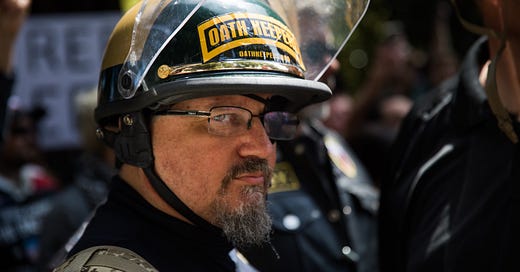Four Messages in the Big Sentence for Oath Keeper Stewart Rhodes
Eighteen years behind bars for seditious conspiracy.
A FEDERAL COURT IN WASHINGTON yesterday sent a message to the country: There is a serious price in prison time to be paid for taking the law into your own hands to achieve political ends.
District Court Judge Amit Mehta sentenced Elmer Stewart Rhodes III, the Yale-educated leader of the militant Oath Keepers, to 18 years in prison for the rarely indicted crime of seditious conspiracy. Rhodes’s top lieutenant, Kelly Meggs, got 12 years behind bars.
As the court said, “A seditious conspiracy . . . is among the most serious crimes an American can commit.” It involves the use of force to overthrow the federal government or to interfere with the execution of its laws. The trial evidence showed that Rhodes had at his beck and call a “quick reaction force” of heavily armed Oath Keepers across the Potomac ready to enter Washington with firearms.
Rhodes’s and Meggs’s sentences were the longest meted out to date among the more than one thousand criminal defendants charged in the January 6th siege of the U.S. Capitol. The significance for Donald Trump and his allies—and for the nation—was impossible to miss.
1. A Message to Donald Trump
Speaking to the court, Phillip Linder, Rhodes’s lawyer, sought to shift the blame to former President Donald Trump: Prosecutors want to make Rhodes “the face of January 6th,” Linder said, but Rhodes was just “a participant”; if you want to “put a face on January 6th, put it on Trump.” Trump cannot have been pleased to have had the obvious—that he was responsible for the chaos and violence at the Capitol—said aloud in court.
Capitol police officer Harry Dunn, a defender of the Capitol that day, concurred with Rhodes’s lawyers: “[They] argued that Donald Trump is the root of the problem,” Dunn told CNN, “and I totally agree. Let’s get him next.”
As a general matter, judges typically reserve longer sentences for those higher up the ladder of culpability. Rhodes got six more years than Meggs; Rhodes was a leader of the Oath Keepers but not, as his lawyer and Harry Dunn both emphasized, of the whole insurrection.
We’re waiting for Special Counsel Jack Smith to indict the true leader. Nerves are fraying in Mar-a-Lago.
2. A Message to Marjorie Taylor Greene
Months ago, MTG began calling jailed participants in the January 6th violence “political prisoners.” Rhodes, in his personal statement to the Court, mimicked Greene: “I’m a political prisoner. . . . I believe every J6er is a political prisoner.”
Rhodes also spent 20 minutes defending himself by claiming that his “only crime [was] opposing those who are destroying our country.” Sounds a lot like Greene and her mentor, Trump.
The court’s response to Rhodes was a heavy-duty sentence, the language the law speaks to extract accountability for violence and the lies that motivate it. MTG has only hinted at violence in support of her lies, but the court, when it said to Rhodes that “You . . . present an ongoing threat and a peril to this country,” may as well have been speaking to her.
3. A Message to Militants
Deterring others is a primary purpose of criminal prosecutions and long sentences. Rhodes’s prosecutors signaled the point by emphasizing, as the New York Times put it, “that the acceptance of political violence was on the rise in the United States and that lengthy prison terms were needed to serve as a deterrent against future unrest.”
Indeed, on May 24, the Department of Homeland Security issued a bulletin warning the country about domestic violent extremists: “The United States remains in a heightened threat environment. . . . In the coming months, factors that could mobilize individuals to commit violence include their perceptions of the 2024 general election cycle. . . . Likely targets of potential violence include US critical infrastructure, faith-based institutions” and many others, including schools and law enforcement.
Juliette Kayyem, a national security analyst for CNN, put the importance of Rhodes’s and Meggs’s serious sentences succinctly. The sentencing, she said, should have a “chilling effect on [violent] groups,” making it “more difficult for them to recruit and—as important—for them to raise money.”
4. A Message to the Country
In urging a lengthy prison term for Rhodes, prosecutors stressed what was at stake for the nation:
The justice system’s reaction to January 6 bears the weighty responsibility of impacting whether January 6 becomes an outlier or a watershed moment. . . . Left unchecked, this impulse [for political violence] threatens our democracy.
Of course, there is no greater threat to American democracy than Trump himself. I am confident that Jack Smith will bring him to account for creating the conditions that led to January 6th.
But ultimately, Trump’s fate, and also that of the insurrectionists, will be in the hands of the voters in next year’s presidential election. Trump has promised to pardon “a large proportion” of January 6th participants. Yesterday, Ron DeSantis, Trump’s closest competitor for the Republican presidential nomination, said he would consider pardoning “some.”
Such talk of pardons, says Michael Fanone, one of the police officers injured on January 6th, “should outrage all Americans.” He’s right. It’s up to all of us to remember these promises in the 18 months ahead. Voters will consider whether we want a lawful society or one where the political ends justify violent means. Yesterday’s sentences tell us where our system of justice stands. The rule of law and our freedom from violence will be on the ballot in November 2024.






